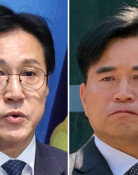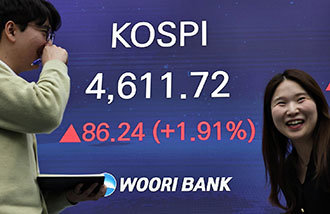[Editorial] Revolving door plagues state-run firms
[Editorial] Revolving door plagues state-run firms
Posted September. 19, 2000 16:25,
The degree of moral hazard uncovered at the state-owned enterprises by the fact-finding commission truly boggles the mind. Most of the enterprises have ignored corporate restructuring and have pursued "scratch each other's back" management. In the light of the fact that the government has been actively calling for reform of state-owned enterprises, the current situation leaves us with a question as to what the government really has been doing.
The rampant moral hazards at state-owned enterprises could be attributed to the "parachute" and "revolving door" policies of hiring of so-called experts. The string of administrations has appointed unqualified individuals lacking expertise to high posts of the enterprises, much like handouts. As such, the appointed individuals have only concerned themselves with scratching the backs of the labor union leaders to safely ride out their terms rather than implement an overhaul.
During the militarist administration period, "the badges" held the presidency post at most of the enterprises, while the "backpackers" (belonging to the Democratic Mountain Hikers Club) held the posts during Kim Young-Sam's administration. While many hoped for a change, motivated by the "IMF Crisis", as time passed the highest posts at the enterprises are being used as carrots for politically influential individuals, as well as the failed candidates of the ruling party.
Although the retired bureaucratic officers might gain greater expertise as they go through the revolving doors to various positions among state-owned enterprises, they have added to the conflicts of interest at the enterprises.
In the case of Kookmin Bank as cited by the fact-finding commission, the former vice chairman of the Financial Supervisory Commission went through the revolving door upon his retirement to the post of bank chairman. Then, as the labor union protested, the bank appeased the union by earmarking 16.2 million won for a special fund for the union.
Although such posts are filled through a commission for the appointment of office at times, the truth of the matter is that the individuals are predetermined and the commission merely confirms the choice as a matter of formality.
Such heads of enterprises chosen through political considerations can only fail to bring about the necessary restructuring, as they have various individuals to thank, they end up needing excessive funds to "repay" favors. The conflicts of interest at state-run enterprises must necessarily lead to an overall governmental moral hazard.
The power struggle and supremacy of the labor union at the state-owned enterprises also are major problems. However, the reason for it being out of control is that the unions, through their opposition campaigns to the "parachute" or "revolving door" appointments, end up taming such heads of enterprises. The presidents of the enterprises barely maintain their posts through appeasement of the labor unions, and they simply lack the power and authority to overthrow the deep-rooted unions to bring about reform.
There are enterprises that continue to operate at losses due to excessive overhead, which continually adds to their liabilities. These enterprises must be overhauled, closed down, merged or privatized.



![쓸개 파열로 “사흘 남았다” 판정받은 시인…18년뒤 “너를 아껴라” 속삭여[손효림의 베스트셀러 레시피]](https://dimg.donga.com/c/138/175/90/1/wps/NEWS/IMAGE/2026/01/08/133113134.1.jpg)

![“‘휴지심’ 아직도 버려?” 0원으로 집안 환경 바꾸는 법 [알쓸톡]](https://dimg.donga.com/c/138/175/90/1/wps/NEWS/IMAGE/2026/01/07/133110227.3.png)

